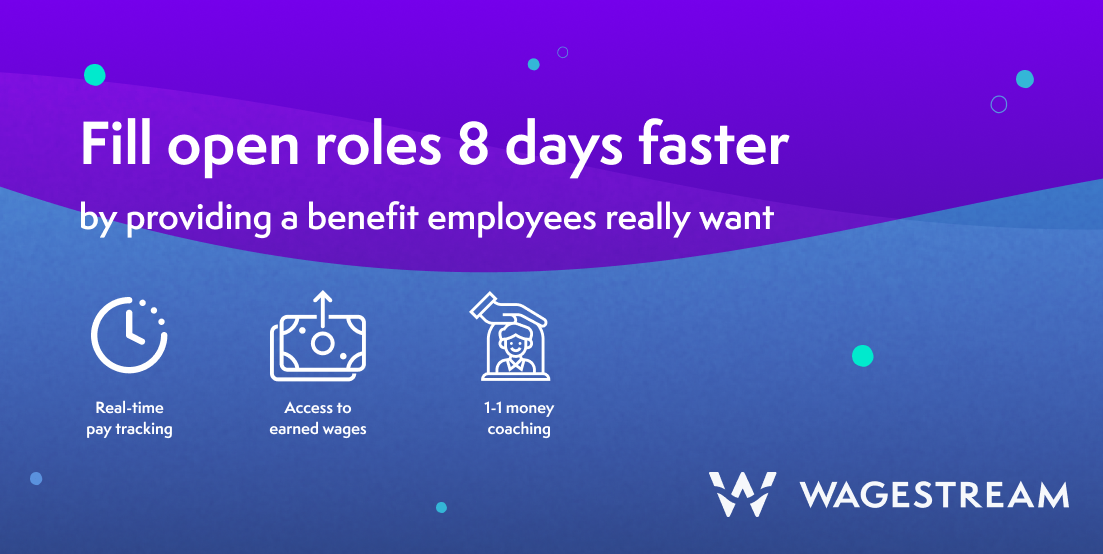

Wagestream was founded in 2018 when CEO Josh Vernon saw one of his friends get into trouble after using a payday loan to buy a fridge. Over the past 3 years Wagestream has grown to become the mission-led responsible experts in financial wellbeing, providing innovative solutions such as earned wage access, pre-pay savings and 1:1 live chat financial coaching to solve the number one concern of hospitality employees - financial stress.
Backed by social impact charities and industry bodies – Financial Inclusion Action Plan (FIAP) Social Tech Trust, Barrow Cadbury Foundation, Joseph Rowntree Foundation, Fair by Design and Big Society Capital – it’s our mission to make money simple not stressful, ensuring everyone has the tools they need to secure their financial futures. We support more than 750,000 employees across the globe at organisations such as Hungry Jack’s, Pizza Hut, Brewdog, Leon and many more.
How QSRs can create flexibility for customer-facing workers

There’s a lot of talk about flexibility at work, but what about workers who can’t work from home?
Flexibility is perhaps one of the biggest workforce trends to have emerged during the lockdowns and restrictions of 2020 and 2021. There’s been a big focus on working from home and choosing hours for information workers, but what about those that are customer-facing?
For the QSR industry and a significant portion of the workforce, working from home or logging off for a few hours in the middle of the day is not an option.
So, in light of the labour shortages many QSRs are currently dealing with, how can customer-facing workers get flexibility in their roles and what can employers do?
1. Listen to what staff really need
For QSR workers, instability has been a massive factor of the last 18 months. Data from Seek shows that prior to the pandemic, job stability was the number four concern of job-seeking employees, but stability has now jumped to become the number one concern. Lockdowns and reduced trade have seen many people temporarily or permanently lose their jobs, while others are working less hours with uncertainty about what is to come.
Similarly, a survey from AMP showed that hospitality workers are 86% more financially stressed than the national average for employees.
It’s this stress that has potentially positioned QSRs as unideal places for people to work if they need economic security. Initiatives that can reduce this stress and provide financial security can therefore set businesses apart.
2. Identify other areas for flexibility
The Australian Bureau of Statistics found that two in five people with a job work from home at least once a week, compared with one in four prior to the pandemic. It’s a large percentage, but it also shows there are a lot of people who aren’t really able to work from home.
Though flexibility has quickly become the buzzword of many workplaces, it needs to encompass more than working from home. For those who have customer-facing roles, there are other ways employers can offer flexibility at work.
Some organisations have started by listening to and empathising with employees through internal webinars and Q&A sessions. These can be effective ways for QSRs to solve some of the key concerns of their employees.
One solution has been to provide the technical ability for employees to swap and shorten shifts when they need to.
Another output is to think about areas where flexibility can make a difference - such as personal finances. For shift workers, the ability to track exactly how much they’ve earned at any point in the pay cycle and also to access a percentage of the money that’s been earned can be a huge assistance when it comes to managing money. It means these employees have certainty around their earnings and the ability to minimise their need to borrow – reducing the amount of interest they would potentially be paying.
3. Assess the impact
Many businesses around the world are trying to quantify what the working from home switch has meant for their businesses. Conversations have been focused on office space, collaboration and productivity of staff. It will be a while before we fully understand the impact this flexibility has had on business outcomes.
However, it’s easier to track the impact of some other types of flexibility – such as flexible pay (also known as earned wage access). AMP’s 2020 Financial Wellness research found that one in two people report some level of stress about their finances, with severe and moderate financial stress impacting almost 2 million Australian workers. The cost to the Australian economy is approximately $30.9 billion a year due to distraction and absenteeism. Those that are financially stressed are distracted for 7.7 hours a week and absent for a further 1.2 hours a week through sick days.
Wagestream's analysis of 1 million earned wage transactions offers some insight into how people are using earned wage access and the impact it has on financial stress. Some of the key findings are:
- Six in 10 people are focused on tracking their earnings only
- People that do withdraw take out a quarter of their salary
- Earned wage access reduces reliance on credit and interest charges
- With continued access to earned wages, people reduce their withdrawals over time
Ultimately we found that for QSR workers earned wage access can improve quality of life. Seven in 10 people feel more in control of their finances and one in two people say they’ve experienced an improvement in their ability to plan their finances.
Connect Now
Other Articles

Mad Mex: focusing on wellbeing to boost recruitment

How QSRs can tackle cost of living crisis

Evolving wellbeing programs: Is it more effective to focus on prevention rather than cure?

Could wellbeing initiatives help you win the war for talent?

How a financial wellbeing program has helped Honest Burgers recruit faster and fill more shifts in the UK

The secret sauce for improving financial wellbeing: an interview with Jenny McKie, Chief People Officer at Hungry Jack’s
